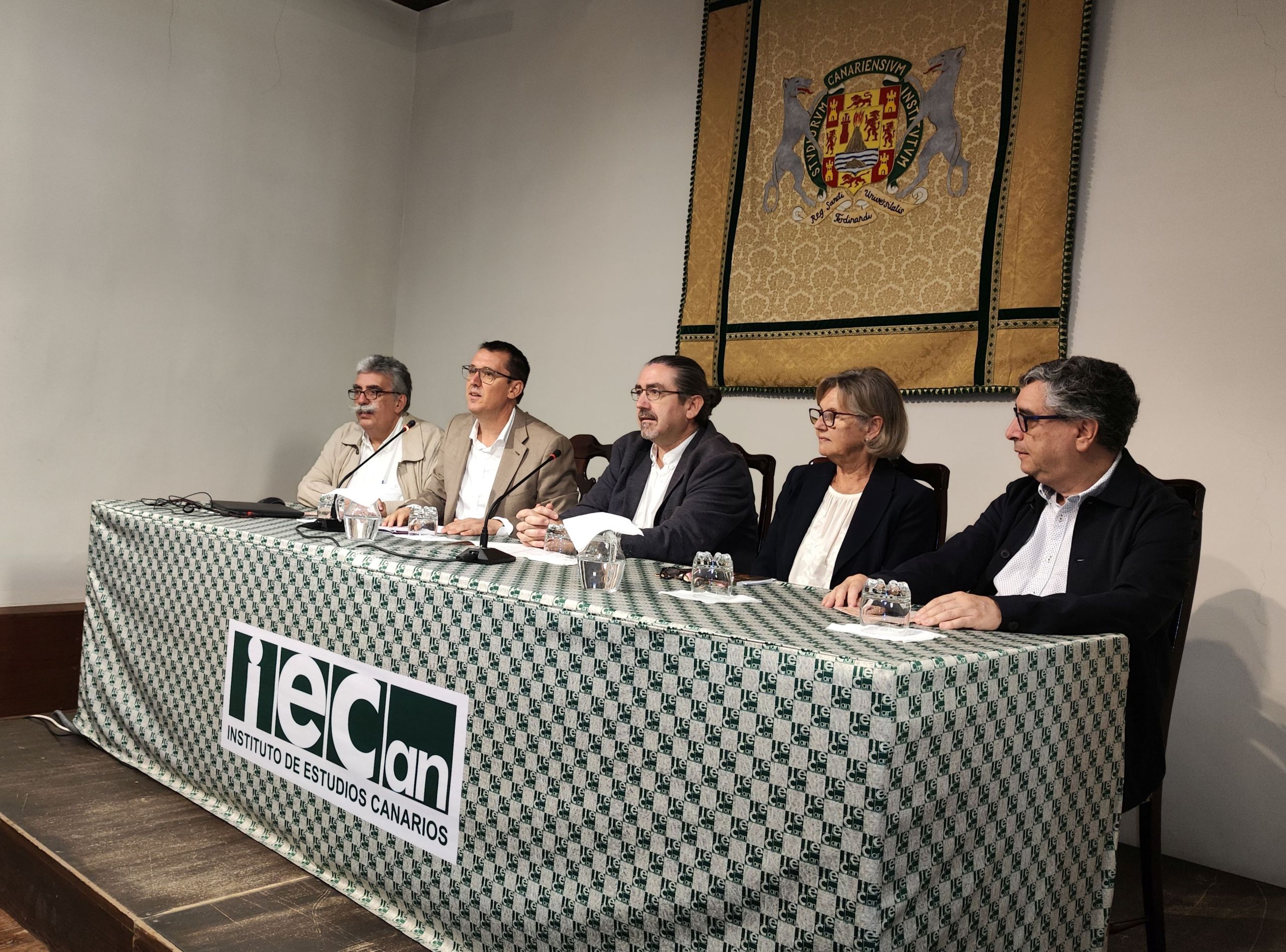Today, the historic Casa de Ossuna hosted the institutional opening of the 9th International Seminar of the Ibero-American Network for Research on Colonial Urbanism (RII_UC), a leading academic event that places La Laguna at the centre of the international debate on European colonial urbanism in the context of early globalisation. The event, which is being held from 14 to 16 October at the Institute of Canarian Studies (IECan) and in the Elías Serra Ràfols Lecture Hall at the University of La Laguna, is part of the commemoration of the 25th anniversary of La Laguna’s inclusion on UNESCO’s list of World Heritage Cities.
The institutional opening was attended by the Councillor for Cultural Heritage of the City Council of La Laguna, Adolfo Cordobés; the Director of the Institute of Canarian Studies (IECan) and the Secretariat of University Institutes and Publications, also representing the Vice-Rectorate for Research and Transfer of the ULL, Roberto J. González Zalacain; and the Deputy Director of the IECan and representative of the organising committee, Matilde Arnay de la Rosa.
In addition to Fernando Vela Cossío, professor at the Polytechnic University of Madrid, director of the Centre for Research into Traditional Architecture (CIAT) and one of the researchers responsible for the RII_UC, and Juan Manuel Bello León, director of the Institute of Medieval and Renaissance Studies at the ULL.
Organised by the City Council of La Laguna, the ULL and the IECan, the seminar brings together more than thirty specialists in archaeology, history, anthropology, architecture, urban planning, heritage and museology from Spain, Portugal and various countries in the Americas. The aim is to renew knowledge about early Hispanic urban planning, analyse its implications for contemporary heritage management and share scientific experiences relating to cities that were foundational models or spaces that, for various reasons, were abandoned and today constitute valuable sources of material research.
La Laguna, a heritage research laboratory
At the opening ceremony, Adolfo Cordobés, Councillor for Cultural Heritage at La Laguna City Council, emphasised that “this seminar is much more than an academic event, as it provides an opportunity to highlight La Laguna’s role as a historical reference point and contemporary laboratory for heritage research. This initiative is a statement of principles on the role that La Laguna must continue to play as a city that not only preserves its founding layout, but also puts it at the service of knowledge and international dialogue”.
For the councillor, ‘celebrating the 25th anniversary as a World Heritage City with this high level of reflection and with the important involvement of the IECan and the ULL not only consolidates La Laguna as an international centre for reflection on colonial urbanism, historical planning and heritage management, but also constitutes a way of projecting our history into the future’.
For his part, the director of the Institute of Canarian Studies, Roberto J. González Zalacain, explained the importance of a seminar that will analyse the challenges of research and management of colonial urbanism in key cities in the Ibero-American world and underlined the IECan’s commitment to interdisciplinary research.
‘The Casa de Ossuna, the Institute’s historic headquarters, is hosting this seminar as part of its founding mission: to be a space for thought, a living archive and a platform for researchers to meet. La Laguna was an urban model in the 16th century and today it is once again a laboratory for ideas about cities, memory and heritage,’ he said.
Over three days, case studies will be discussed ranging from Ciudad Vieja in El Salvador to Santa Fe la Vieja in Argentina, including Panamá Viejo, La Española, Betancuria, La Laguna and other key enclaves in the urban history of the Ibero-American world. The programme includes presentations focusing on the city of Tenerife, as well as studies on urbanisation in the Canary Islands and debates on public morality and urban planning in the early days of the city.
Research in the municipality
In this regard, research will be presented, such as that by Sergio Pou Hernández (ULL), focusing on the old public prison in La Laguna; and that led by Javier Soler Segura and Josué Ramos Martín (Cultania) on the Archaeological-Heritage Guide to this unique World Heritage city in the Canary Islands. In addition to that of Ithaisa Abreu Hernández, Efraín Marrero Salas and Hacomar Ruíz González (PRORED) on the archaeological interventions carried out in the Plaza de Los Remedios, and the presentation by Francisco Báez Hernández, Alejandro Larraz Mora and Roberto J. González Zalacain (ULL and IECan) on the project to build the brothel in the early days.
At the regional level, other notable presentations include those by Eduardo Aznar Vallejo (ULL) on the urbanisation process in the Canary Islands; Matilde Arnay de la Rosa (ULL) on the archaeological excavations at the Church of La Concepción in Santa Cruz de Tenerife; Rosa López Guerrero (Heritage Service of the Cabildo of Fuerteventura) on the Pozo Negro Valley, and Marco Moreno Benítez (Tibicena), who will speak in two sessions on the Franciscan convent of Betancuria and the northern site of the Cathedral of Las Palmas de Gran Canaria.
The seminar brings together leading researchers from America and Europe, who will address case studies on colonial urbanism in various contexts. In addition to those already mentioned, the presentations include those by William R. Fowler (Vanderbilt University, USA), Luis María Calvo (Santa Fe, Argentina), Jorge Pável Elías Lequernaqué (University of Piura, Peru), Fernando Vela Cossío (Polytechnic University of Madrid), Iván Ghezzi (Ministry of Culture of Peru), Víctor Manuel López (Casa de la Cultura de Casma, Peru), and Gabriel Cocco (Ethnographic and Colonial Museum and Santa Fe la Vieja Archaeological Park, Argentina).
In addition to Iban Sánchez Pinto (University of the Basque Country), Mirta Linero Baroni and Juan Ramón Muñiz Álvarez (both from the Panama Viejo Trust), Mady Miranda (University of Panama), María Teresita de Haro (University of Buenos Aires) and Víctor González Melgar (Complutense University of Madrid), among others.
Bibliographic exhibition
In addition, an exhibition of documentary collections on colonial urban planning and historical heritage from the IECan Library has been inaugurated in the inner courtyard of Casa Ossuna, which will remain open to the public until 24 October.
This seminar reinforces La Laguna’s commitment to research, conservation and dissemination of its urban heritage in a particularly significant year for the city, which is celebrating 25 years as a World Heritage Site, reaffirming its vocation as an international benchmark in heritage management and the construction of citizenship through history.



